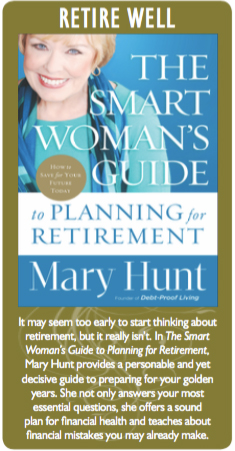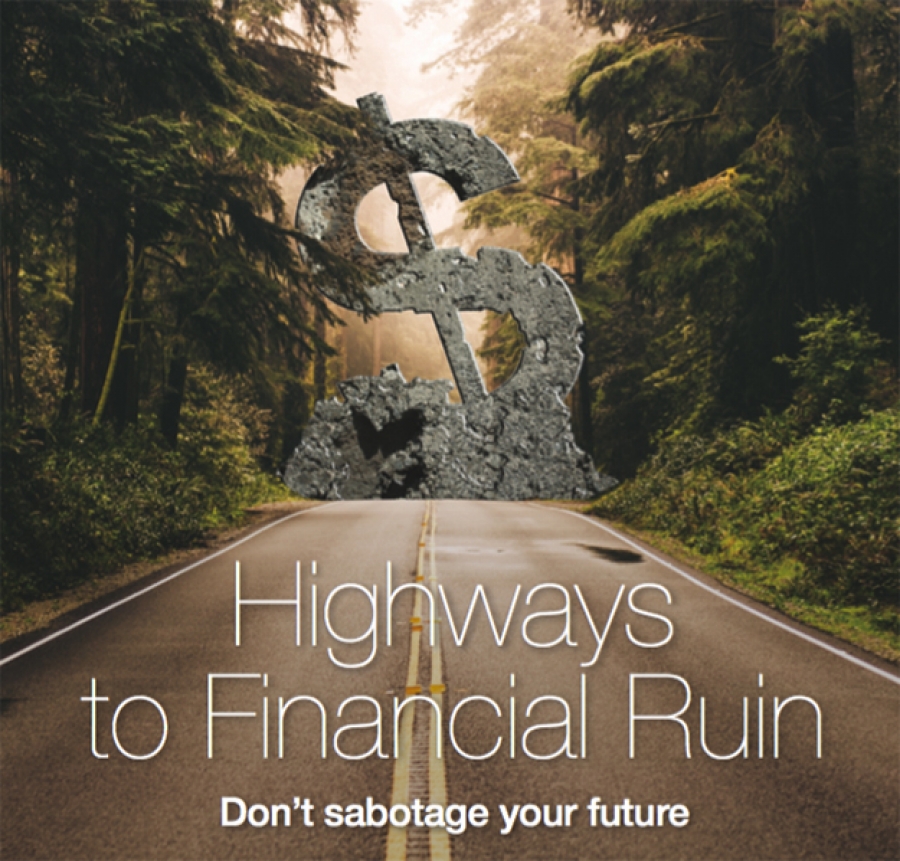BY MARY HUNT
I LOVE THE CABLE SHOW What Not to Wear. I haven’t achieved wardrobe perfection yet, but I have become more aware of what constitutes a fashion risk. In a similar way, I want you to learn “What Not to Do” in your financial life. We live in a fast-paced, peer-pressured, consumer-driven world. The way to counter those things is to learn what not to do with your money.
Don’t Live on Credit
Debt, particularly unsecured, consumer debt (think credit card debt, personal or student loans, and any other debt not secured by valuable assets) is like cancer. It starts small and may even be manageable. But then, it will grow and sabotage your financial future. When you can no longer pay your balance in full (opting for the minimum payment due), you’ve reached a dangerous place in your life.
Don’t Live an Overstated Lifestyle
According to columnist Ellen Goodman, “Normal is getting dressed in clothes that you buy for work ... and driving through traffic in a car that you are still paying for ... in order to get to the job [that pays] for the clothes, the car, and the house you leave vacant all day so you can afford to live in it.” Think about how crazy that is.
You may not depend on credit to get through every month, but you may spend every last nickel on a pretentious lifestyle. When an inevitable disaster hits, it won’t be pretty. A frugal lifestyle (in which you give, save, and live below your means) will make you much happier. If your leased cars, mortgaged furniture, private school tuition, cable TV, shopping sprees, and $300 monthly mobile data plans keep you from regularly giving, saving, and preparing for retirement, you’re living way beyond your means. And for what? To impress the neighbors? To make sure your family looks good?
Don’t Strip Home Equity
Lenders will encourage you to access your home’s equity to resolve credit card debt, pay for major life events (like a wedding), or buy a much-deserved swimming pool. That’s a lousy idea with dangerous consequences. If you move debt to your home and can’t make those big payments, you’ll lose your home through foreclosure. Stop looking at your home’s equity as a pool of money to dip into. Buckle down, and get serious about paying off your credit cards now. Stop looking for shortcuts and phony fixes. Start paying and stop charging.
 Don’t Raid Retirement Accounts
Don’t Raid Retirement Accounts
When it comes to your employer-sponsored retirement plan, you can’t have your cake and eat it too. You can’t take advantage of investing your untaxed income and also have unrestricted access to the funds. The money you are investing is for retirement. The government allows you to invest pretax dollars. But here’s the deal: you must relinquish access to that money until you reach retirement age.
Most retirement plans allow you to borrow from your account for immediate needs — which is, in my opinion, unfortunate. Although taking a loan may seem like an easy way to cover a big expense, it has serious drawbacks. Once you take money from the account, you stop growth momentum. Never forget that it’s not the amount of money you put into the account that makes the difference. It’s the compounding growth over a long time that is going to turn your meager deposits into something glorious. Don’t think of your retirement account as a liquid asset. It’s a frozen asset that is out of reach for now. Direct your energy instead toward reducing your expenses. Living beneath your means will eliminate the temptation to borrow from your retirement account.
Don’t Procrastinate
Many people incorrectly assume it will be easier to save for retirement later in their careers, so they put it off.
In reality, procrastination is just wealth suicide on an installment plan. The old way of thinking was to pay off the mortgage, pay for the kids’ college, and then save for retirement. That worked fine when life expectancies were much shorter. But nowadays, you may spend almost as many years in retirement as you did in your career.
As a result, you need a bigger nest egg than previous generations. A bigger nest egg requires a more aggressive approach to retirement savings while you’re still working. ![]()








